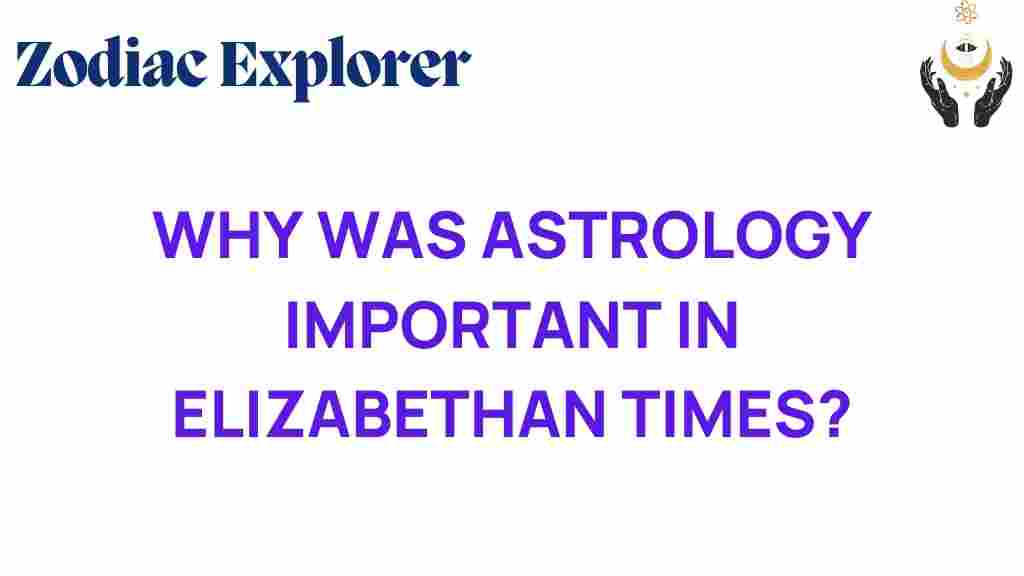Unraveling the Mystique: The Significance of Astrology in Elizabethan Times
The Elizabethan era, spanning from 1558 to 1603, was a time of remarkable transformation in England. It was an age characterized by artistic brilliance, political intrigue, and a deep fascination with the cosmos. Central to this cultural milieu was the practice of astrology, which held significant sway over the thoughts, beliefs, and decisions of the time. This article delves into the historical significance of astrology during the Elizabethan era, exploring its impact on royal decisions, societal norms, and the broader cultural beliefs of the period.
Astrology and Its Historical Significance
In the Elizabethan era, astrology was more than just a form of fortune telling; it was a respected discipline intertwined with the scientific, medical, and philosophical understandings of the time. Astrologers were often consulted by the nobility and royalty, as the belief in the celestial influence over human affairs was widely accepted. The stars and planets were thought to hold the keys to understanding human behavior and predicting future events.
- Astrological charts: These were meticulously created to map the positions of celestial bodies at specific times, such as births or significant events.
- Horoscopes: Personalized interpretations of astrological charts were common, providing insights into individual destinies.
- Political decisions: Leaders relied on astrological guidance to make critical choices, from military campaigns to royal marriages.
The Role of Astrology in Royal Decisions
The influence of astrology in the royal court cannot be overstated. Queen Elizabeth I herself was known to have consulted astrologers, including the famous John Dee, whose influence extended beyond astrology into the realms of science and occult philosophy. This relationship between royalty and astrology manifested in various ways:
- Military Strategy: Astrologers would advise on the best times to engage in battles based on celestial alignments.
- Marriage Alliances: The timing and compatibility of royal marriages were often determined by astrological compatibility.
- Coronation Dates: The auspiciousness of dates for coronations was meticulously calculated to ensure a prosperous reign.
Cultural Beliefs and Societal Norms
Astrology permeated the daily lives of people in the Elizabethan era. It influenced not just the elite but also the common folk, shaping their perceptions of fate and fortune. Here are some ways in which astrology was integrated into societal norms:
- Daily Life: Many individuals consulted their horoscopes as part of their daily routines to guide decision-making.
- Medical Practices: Physicians often incorporated astrological insights into their diagnoses and treatments, believing that celestial bodies could influence health.
- Festivals and Events: Important events and festivals were frequently planned according to astrological calendars.
Astrology as a Tool for Fortune Telling
While astrology was revered in many circles, it also served as a popular means of fortune telling among the general populace. The common people sought guidance through various astrological practices:
- Star Reading: Observing the stars for omens and predictions became a communal activity.
- Astrological Almanacs: These publications provided forecasts and advice based on celestial events, making astrology accessible to the masses.
- Public Astrologers: Street astrologers would offer readings and predictions, becoming part of the vibrant street life.
The Intersection of Science and Astrology
During the Elizabethan era, astrology was often viewed as a legitimate science. Great minds of the time, such as Galileo and Copernicus, were involved in astronomical studies that laid the groundwork for modern science. However, astrology remained a popular belief system, with many scholars attempting to reconcile the two:
- Astrology and Astronomy: The lines between these two fields were blurred, with many astronomers practicing astrology.
- Philosophical Implications: The belief that celestial bodies influenced human affairs was tied to greater philosophical questions about free will and destiny.
- Scientific Critiques: Despite its popularity, some intellectuals began to critique astrology, leading to debates that would continue into the Enlightenment.
Astrology in Literature and Art
The fascination with astrology during the Elizabethan era is evident in the period’s literature and art. Many writers and artists incorporated astrological themes into their works:
- Shakespeare: The Bard often referenced astrological themes and characters in his plays, reflecting the era’s beliefs.
- Poetry: Poets wrote extensively about love, fate, and the stars, using astrological imagery to convey their messages.
- Visual Arts: Artists depicted celestial scenes, illustrating the beauty and mystery of the cosmos.
Astrology in Contemporary Context
Today, the remnants of astrology in popular culture can be seen in horoscopes, zodiac signs, and various forms of fortune telling. However, understanding its historical context enhances our appreciation of its cultural significance:
- Modern Astrology: While often dismissed as superstition, many people still find value in astrological insights.
- Cultural Revival: There has been a resurgence of interest in astrology, particularly among younger generations seeking meaning and guidance.
- Astrology and Mental Health: Some individuals use astrology as a tool for self-reflection and understanding, linking it to contemporary wellness practices.
Step-by-Step Guide to Understanding Elizabethan Astrology
To appreciate the role of astrology in the Elizabethan era, one must consider several steps:
- Study Historical Texts: Explore writings from the period, such as astrological manuals and literature referencing astrology.
- Examine Astrological Charts: Analyze surviving astrological charts and understand their significance in context.
- Explore Cultural Practices: Investigate how astrology was woven into daily life, from personal horoscopes to public events.
- Connect with Modern Interpretations: Compare historical beliefs with contemporary practices and understand the evolution of astrology.
Troubleshooting Common Misconceptions about Astrology
While the allure of astrology continues, several misconceptions persist. Here are some common misunderstandings and clarifications:
- Astrology is not science: While astrology incorporates astronomical observations, it is often categorized under metaphysics rather than empirical science.
- Horoscopes are deterministic: Many believe horoscopes dictate fate, but most practitioners advocate for astrology as a tool for self-reflection rather than a strict guide to destiny.
- Astrology is only for the elite: Historically,
This article is in the category Myths and created by ZodiacExplorer Team
